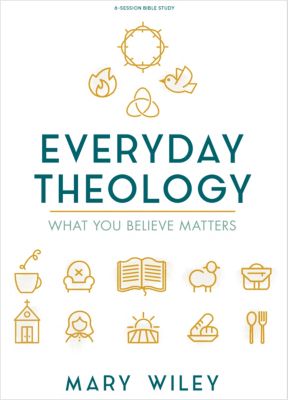Scary. Academic. Stuffy. Too hard for me.
Real women in a real church (my church) spoke these words regarding studying theology, and the more people I speak with, the more I realize they aren’t alone.
Theology often gets the reputation of being solely academic, with vocabulary words and potential pop quizzes rather than what it actually is: the study of God that results in both delight and worship as we learn more about Him.
You may not realize it, but you are already operating out of your theology. You make decisions from what you believe is true about God every single day. It affects what you choose to do with your time, how you spend your money, and what you deem important. Yet studying theology helps us better know God and better match what is true about God with how we should live that truth. Studying theology can delve into nuances as you get into the deep waters but beginning the endeavor and benefiting immensely from it is not as complicated as it seems.
Here’s how you can begin studying theology today:
1. Read God’s Word.
This may seem overly simplistic, but too often we seek to gain knowledge apart from its source‑ to simply know the answers without knowing the why behind them. Often, our reading of His Word gets a bit atrophied.
To know and understand God rightly, we must go to the primary source He has given us: His Word. God has revealed Himself in His Word and as God the Son takes on flesh, revealing God in His life, death, resurrection, and ascension. Whether we are reading history, law, wisdom literature, or a pastoral epistle, there’s learning to be had about who God is (known as “theology Proper”), what He says about His creation, what He is doing in the world, and how we should rightly respond.
When we read God’s Word, and through the illumination of the Holy Spirit we understand its teaching, our response should be rightly ordered worship. Our orthodoxy should always lead to adoring orthopraxy; the development of our theology to lead to deeper practice of faithfulness in our everyday lives.
Reading with the goal of knowing God and studying to further develop our theology means we read not only to understand the words, but also to allow His Word to dwell deeply within our hearts. Often, in my study, this takes the form of reading the same passage over and over again, enjoying those moments when the Holy Spirit helps me understand a piece of God’s Word that I didn’t catch in the earlier reads.
A fruitful study of theology requires a consistent stirring of affections for God and His Word and a fascination with His ways. A fascination with God without a hunger for His Word is a hallmark indication that we’ve made Him in our own image, seeking to benefit from Him and receive gifts from His hand, but not intent upon knowing Him deeply and obeying Him sacrificially. Our theology must be founded in His Word.
2. Ask questions.
As we seek to study theology, reading passages over and over again and asking God to mold our understanding of Him through His Spirit, our focus should be seeing God in the text. What is He revealing about Himself? About His expectations for His people? About how He has created people and His right design for them and His world? What observations can you make of the text? What questions does the passage leave unanswered? Approach the text with wild curiosity, even if you’ve read it fifty times already.
Don’t only take your curiosity into the text, though. Theology happens best in community, so as you discover questions you struggle to answer or you develop ideas from the text, seeking to understand it in the context of the passage and book it is in, as well as in the grand narrative Scripture is telling, find a group of trusted co-laborers with which you can discuss and sharpen those ideas.
God has given us the church as an outpost of the kingdom of heaven with an entire body of people who can help us along in our walks. In our individualistic society, it’s easy to forget the necessity of traveling the road with our brothers and sisters, yet this is the example we see in God’s Word—He has given His Word and His presence to a people He has purchased with the blood of Christ, and that people is to be closer to us than our biological families. It is in hearing the thoughts of others that we see the fallacies in our logic or better understand God’s Word. The glory of these conversations is the intention and the result: worshiping rightly our God.
3. Read good books.
Knowing where to get wise counsel in book form is a priceless resource. Sources matter, just like they did when you wrote research papers in high school, and those that didn’t count then shouldn’t be relied on now. As you read wise thinkers, you will be challenged to think more wisely as well.
This doesn’t mean you need to read a seminary textbook cover to cover or that you need to learn Latin, Greek, or Hebrew to study well. Do check your sources and do your homework. Don’t take the easy way out and search your favorite speaker or writer and “what do they say about …” to determine the questions you have about theology. Instead, seek to develop hypotheses (yes, I’m continuing this high school motif here) and then prove or disprove them with primary sources and good contemporary books.
The study of theology is always a worthy endeavor because it is an endeavor of not only the mind, but also the heart. May what we know about God move us to know Him, worship Him, and obey Him well.


